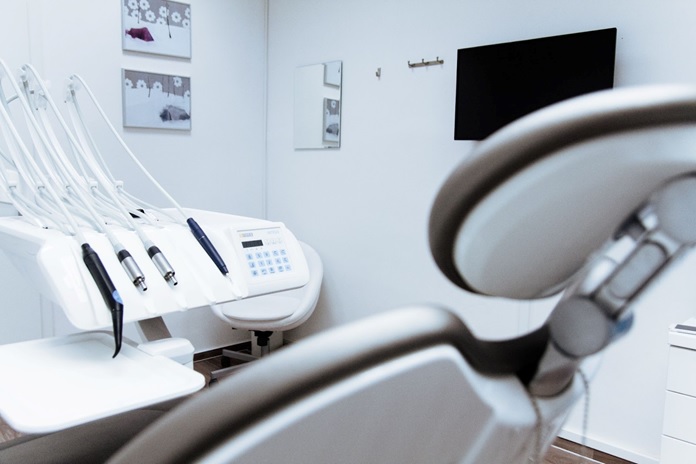Essential Equipment to Have in Your Dental Office

Excellent dental care is important for the overall health of your patients. As a great dentist you must provide checkups, procedures and operations that are effective and as pain-free as possible to keep teeth and gums healthy. In order to do that you must have the right tools for the job, and the equipment you use should be in excellent working order and well maintained. Equipment is one area where you can’t cut corners with costs, as it will compromise the level of care you can provide your patients. But what are the essentials a dental office needs to function at a high level? Let’s take a look.
Basic instruments
Let’s start with the simplest tools that a dentist uses.
Mirrors and probes
An examination usually starts with a small hand held mirror, which also acts to reflect light into different parts of a patient’s mouth, and review procedures as they progress. Dentists use two types of probes – a periodontal probe will test pressure or gauge the periodontal pocket if it exists, and determine its depth. An exploration probe can be used to determine the level of bacterial plaque, the existence of cavities, etc.
Tweezers and pliers
Dental tweezers are used for a wide variety of tasks, such as separating tissues, extracting or inserting things into the oral cavity, and to suture. Different tweezers are available for different procedures, so a selection is essential. Dental pliers also have a wide range of applications, especially in orthodontics and in the laboratory, such as cutting wires and pins, bending hooks, etc.
Chairs
Dental chairs are central to good practice, providing a dentist with adjustable positions to perform different procedures. They should maximise patient comfort, so ergonomic chairs are essential, well padded, with armrests and ample leg room. The dentist and hygienist should be able to operate easily, so there must be enough room in the surgery for the chair to be placed and adjusted. Adjustment should be controlled by a foot switch or touchpad, and feature various programmed settings.
Sterilisation
A dental’s equipment needs to be sterilised after every patient, so having up to date and well maintained equipment is essential. Dental tools should be cleaned quickly and efficiently to provide quality care, and eradicate the possibility of cross-contamination. They typically utilise either steam or dry heat to completely sterilise and dry instruments and equipment—and it usually doesn’t take more than a few minutes.
Handpieces
A dentist relies on a variety of handpieces to complete routine checkups and more complex operations. Handpieces serve a wide range of functions, from drilling to filling, but regardless of their usage, they need proper care and attention to function long-term, and provide the best possible service to patients. The degree of control and accuracy that dentists, hygienists and lab technicians get from handpieces means that all manner of procedures, both simple and complex, can be performed with minimal fuss (and pain), from straightforward cleaning and removal of decay to major operations.
X-Ray
As a dentist you will be taking X-rays on a daily basis – the quality of imaging is better than ever, which means a greater level of accuracy and care. Radiographic equipment is very sophisticated, and very safe in terms of radiation. A properly cared for machine will produce the best, most detailed images, and will have a long life. It should have a routine quality assurance test completed at least once every 3 years (annually for a hand-held set). An X-ray machine is an essential for any dental practice.
Lights
Operating lights are extremely important for dentists, their assistants, and hygienists. Successful operations and accurate diagnoses depend on optimal lighting. Many quality dental lighting solutions rely on flexibility, and they can be mounted on the ceiling, wall, or cabinet. And lights mounted on adjustable swing arms gives the dentist the ability to manoeuvre lighting for any purpose. The lamps should be a suitable Kelvin temperature that doesn’t tire the eyes and provides neutral lighting to identify discolouration in teeth.
These are some of the essentials that dentists require a wide range of equipment in order to provide top-quality care to their patients – and nothing less will do.


 How to Choose the Right Stairlift Solution for Your Home
How to Choose the Right Stairlift Solution for Your Home  Basic First Aid for Fractures: Stabilizing the Injury
Basic First Aid for Fractures: Stabilizing the Injury  Sweet Treats and Convenient Picks: Navigating the World of Edibles and Disposables
Sweet Treats and Convenient Picks: Navigating the World of Edibles and Disposables  The Gut’s Tale: 5 Captivating Books to Dive Into
The Gut’s Tale: 5 Captivating Books to Dive Into  Top Tips To Help Keep You Looking Younger For Longer In Australia.
Top Tips To Help Keep You Looking Younger For Longer In Australia.  Is Bangkok a Good Place to Get LASIK
Is Bangkok a Good Place to Get LASIK  5 Situations Individuals Should Seek the Services of a Birmingham CPA
5 Situations Individuals Should Seek the Services of a Birmingham CPA  Life Without Teeth: Navigating Edentulism in Panama City Beach, FL
Life Without Teeth: Navigating Edentulism in Panama City Beach, FL  Should You Hire A CPA For Your Small Business?
Should You Hire A CPA For Your Small Business?  Boba Bonanza: Discovering the Delights of Bubble Tea Around the World
Boba Bonanza: Discovering the Delights of Bubble Tea Around the World